DOLE-8 to assist
informal sector workers through TUPAD #BKBK
By
NORMA RAE S. COSTIMIANO
March 28, 2020
TACLOBAN CITY – In
order to mitigate the economic impacts of Coronavirus Disease-2019
(COVID-19) global pandemic, the Department of Labor and Employment
Regional Office VIII will be implementing emergency employment
program for the workers in the informal sector.
Per Department Order No.
210 series of 2020 signed by Secretary Silvestre H. Bello III on 18
March 2020, qualified beneficiaries or those underemployed,
self-employed and displaced marginalized workers who have lost their
livelihood or earnings due to Enhanced Community Quarantine against
COVID-19 may avail of the Tulong Panghanapbuhay para sa Ating
Disadvantaged/Displaced Workers #Barangay Ko/Bahay Ko (TUPAD #BKBK)
Disinfection/Sanitation Project.
Under the TUPAD #BKBK,
beneficiaries will work for a period of ten (10) days for the
disinfection/sanitation of their houses/dwellings and immediate
vicinity of their houses. Beneficiaries will receive wages
equivalent to 100% of the prevailing highest minimum wage in Eastern
Visayas, which is P325.00 per day.
Aside from the payment of
wages, the package of assistance under TUPAD will also include
enrolment of beneficiaries to group micro-insurance and conduct of
Basic Orientation on Safety and Health thru dissemination of
brochures. DOLE will likewise provide the cleaning solutions to be
used in disinfecting and sanitizing their dwellings.
TUPAD #BKBK under D.O. 210
may be implemented by Regional Offices either through direct
administration or through Accredited Co-Partner (ACP). Proponents/ACPs
must prepare and submit Letter of Intent, TUPAD Work Program and
Summary List of Beneficiaries.
DOLE-RO VIII was initially
downloaded only P10million for the implementation of the program.
Regional Director Yahya A. Centi during a meeting with senior
officials of DOLE-RO VIII directed to implement the program the
soonest possible time.
“Considering that most of
our informal sector workers have lost their income now because of
this COVID crisis, I urge everyone to do your part so that we will
be able to deliver the needed assistance”, said Centi.
TUPAD is one of the
flagship programs of DOLE which aims to contribute to poverty
reduction and inclusive growth. It is a community based
(municipality/barangay) package of assistance that provides
temporary wage employment for the displaced workers, underemployed
and self-employed workers.
Church group
reiterates appeal to PH government: Listen to the UN, release
prisoners now!
Press Release
March 28, 2020
QUEZON CITY –
Church group National Council of Churches in the Philippines (NCCP)
reiterated its call for the urgent release of political prisoners,
those that are sick, with chronic or terminal disease, the elderly,
pregnant and nursing mothers, low-risk offenders, and those that are
due for parole or pardon, as advised by the United Nations High
Commissioner for Human Rights (UN OHCHR) Michelle Bachelet on March
26. “Let’s take it from the UN. There is an urgent need to address
the catastrophic risks in prisons by releasing prisoners, especially
now that the country is confronting numerous challenges due to this
pandemic,” Bishop Reuel Norman O. Marigza, NCCP General Secretary,
said.
The Bureau of Jail
Management and Penology has recorded 394% congestion rate in prisons
in the country, which by itself poses grave, potential and
unmanageable outbreaks.
“As the number of positive
COVID-19 cases spike up, the most Christian thing to do is to leave
no one behind. Don’t forget those in prison, especially human rights
defenders facing trumped charges, who have staunchly worked for
social justice and human rights. They need compassion, they need
justice and they need protection. They should be released under
humanitarian grounds,” the General Secretary said.
This is after UN OHCHR
Michelle Bachelet called on the governments to take urgent action to
ensure health and safety in prisons and places of detention. “In
many countries, detention facilities are overcrowded, in some cases
dangerously so. People are often held in unhygienic conditions and
health services are inadequate or even non-existent. Physical
distancing and self-isolation in such conditions are practically
impossible,” Bachelet said.
“The government needs to
quickly address the need to decongest detention facilities and
prisons. We could start with the vulnerable groups – the sick and
elderly, low-level prisoners, and political prisoners or those
detained because of their political beliefs or by simply expressing
dissent,” Bishop Marigza said.
“It is also deeply
distressing that in a time of a public health crisis, authorities
fixate on threats of imprisonment as punishment to disobedience.
This does not only exacerbate the situation in our detention
facilities, but also fails to address the urgent humanitarian needs
of the people,” Bishop Marigza ended.
The National Council of
Churches in the Philippines is the largest aggrupation of mainline
Protestant and non-Roman Catholic churches in the country.
DTI, DA, LGUs to
ensure Price Freeze during quarantine
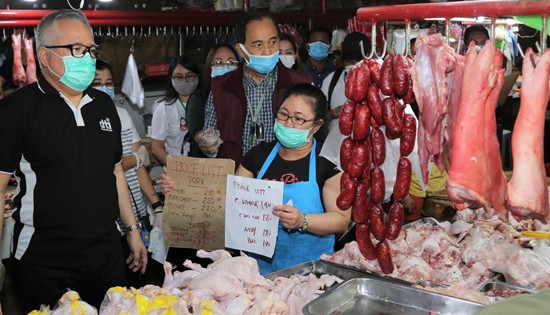
By
DTI-OSEC-PRU
March 26, 2020
QUEZON CITY –
Department of Trade and Industry (DTI) Secretary Ramon Lopez and
Department of Agriculture (DA) Secretary William Dar said they are
working closely with local government units (LGUs) to ensure the
proper implementation of the price freeze on basic necessities.
The two officials made
this assurance after they found many sellers in violation of the
price freeze, as mandated in the Joint Memorandum Circular (JMC) No.
2020-01 issued last 18 March 2020. Secretaries Dar and Lopez went
around Farmers Market in Cubao on 26 March 2020 for a price
inspection.
Following the tripartite
release of the JMC by DA, DTI, and the Department of Health, the
prices of all agricultural and manufactured basic goods, essential
medicines and medical supplies, were frozen at their prevailing
prices for sixty (60) days from the declaration of the State of
Calamity on 16 March 2020, unless sooner lifted by the President.
Sec. Lopez explained that
the marked-up prices were due to the challenges faced during the
first few days of implementation of checkpoints in different LGUs.
He assured, however, that this has already been addressed in the
Inter-Agency Task Force (IATF) on Emerging Infectious Diseases
meetings.
“We are continuously
coordinating at the local level, with the help of Interior Secretary
Año, to ensure the harmonized implementation of the IATF guidelines
on the unhampered movement of cargo. Improvements have been reported
since Friday of last week and we expect the continuation of this for
the following days,” said the trade chief.
He added, “After talking
to sellers and market masters, we have learned that there are
suppliers who sell these goods at the current retail price. In
effect, sellers are forced to increase the prices to still gain some
profit. This is why we are calling on traders and suppliers to sell
goods at a reasonable price in consideration to our local sellers.”
Secretary Dar noted that
farmgate prices for products such as chicken are already below the
cost of production, so suppliers should not sell them at such high
prices. To address this, DA coordinated with market masters to
provide them a list of suppliers that are providing reasonable
prices.
Additionally, Secretary
Dar urged city chiefs of public markets to implement the Local Price
Coordinating Council mechanism, which allows local enforcement units
to strictly ensure the price freeze in their respective areas.
During the inspection of
nearby supermarkets, such as Wellcome Farmers Plaza and Puregold
Araneta, Secretary Lopez was glad to see that these establishments
were in compliance with the price freeze. He and Secretary Dar also
observed that these supermarkets had sufficient supply on their
shelves.
“With the improvements in
the unimpeded movement of cargo, we can also see the improvements in
the grocery stocks of essential food and non-food products. That’s
why we reiterate our call for people not to panic buy because we see
that supplies are slowly being replenished,” Sec. Lopez said.
International Red
Cross and Red Crescent Movement appeals for 800 million Swiss francs
to assist world’s most vulnerable people in fight against COVID-19
Press Release
March 26, 2020
GENEVA – The
International Red Cross and Red Crescent Movement on Thursday
launched a revised emergency appeal for 800 million Swiss francs
(823 million US dollars) to help the world's most vulnerable
communities halt the spread of COVID-19 and recover from its
efforts.
While COVID-19 is already
a global pandemic, it is still possible to reduce its spread and the
number of lives lost by improving access to critical resources.
IFRC President Francesco
Rocca said: “This pandemic is putting at risk entire health systems,
and the situation will worsen in places where those are weak or
inexistent. A strong community response is critical to stop the
virus. COVID-19 affects everyone equally, but migrants and displaced
people, those who are homeless, and those in disaster-prone areas
are among those most exposed to infection, least able to access
health care, and most impacted by loss of income. They must not be
forgotten. We must strengthen the support to our Red Cross and Red
Crescent volunteers who are on the frontline of this response.”
The International Red
Cross and Red Crescent Movement consists of three parts: the
International Committee of the Red Cross (ICRC), the International
Federation of Red Cross and Red Crescent Societies (IFRC), and 192
National Red Cross and Red Crescent Societies.
- The IFRC is appealing
for 550 million Swiss francs (566 million US dollars) to support
National Red Cross and Red Crescent Societies in health care,
prepositioning of goods, risk communication, lessons learned from
global network of local responders, cash grants for families, and
mitigating impacts of large outbreaks). Out of the 550 million Swiss
francs, 150 million Swiss francs is for IFRC to support National
Societies in need, while the remaining 400 million Swiss francs will
be raised by National Societies domestically.
- The ICRC is appealing
for 250 million Swiss francs (256 million US dollars) to respond in
places of conflict and violence, to support medical facilities and
places of detention, curb the spread among and ensure medical access
for displaced people and detainees, and to support National Red
Cross and Red Crescent Societies in their response.
ICRC President Peter
Maurer said: “The international community must increase support now
to the under-resourced communities crippled by conflict, or risk
allowing another humanitarian catastrophe to unfold on top of the
countless others war-torn communities have endured. Viruses know no
borders; this is a global problem that will only be solved by global
action.”
Work already being carried
out by the Movement includes support to National Societies to
increase their health care services, community engagement and
pandemic preparedness activities for vulnerable populations. This
includes the reinforcement of supplies in medical facilities,
expanding sanitation and disease prevention programmes including in
places of detention, and mitigating the socio-economic impact of the
outbreak by ensuring communities maintain access to basic services.
Support will also be provided to States to implement WHO guidelines
to detect COVID-19 early, isolate and treat cases, and trace
contacts.
Both organizations warn
that stemming the pandemic’s rapid global spread requires a
coordinated and society-wide approach, including funding and support
across state and national levels. The impacts of COVID-19 will be
felt everywhere, but the most vulnerable people are at especially
high risk. Governments, individuals, communities, institutions and
donors must work together at all levels to mitigate the health
crisis’s devastating impacts.
The International Red
Cross and Red Crescent Movement is the world’s largest humanitarian
network. Its community-based volunteers and staff help the world’s
most vulnerable people, including those living in countries with
under-resourced health and social welfare systems; people recovering
from recent disasters; migrants and displaced people; those in
conflict zones and who face ongoing violence; people in urban slums;
detainees; and people suffering from the socio-economic impact of
COVID-19.
SB Corporation
opens P1B loan facility for MSMEs affected by Covid-19 lockdown
By
DTI-ROG-SB Corp
March 24, 2020
MAKATI CITY – To
support micro and small businesses affected and cushion the economic
impact of the spread of Covid-19 virus in the country, the Small
Business Corporation is setting up a P1 billion Enterprise
Rehabilitation Financing facility under the Pondo sa Pagbabago at
Pag-asenso (named Covid19 P3-ERF).
The facility will be
implemented once the Community Quarantine declaration is lifted by
the National Government and/or respective Local Government Units.
Trade Secretary Ramon
Lopez explained that the P3-ERF facility is part of the economic
relief program of President Rodrigo Duterte for small businesses
greatly affected and further marginalized by the Covid-19 virus
epidemic.
The SB Corporation, an
agency under the Department of Trade and Industry, said the ERF loan
fund is open to micro and small enterprises with at least one year
continuous operation prior to March 2020, and whose businesses
suffered drastic reduction in sales during the ensuing epidemic.
Micro enterprises with
asset size of not more than P3 million may borrow P10,000 up to
P200,000 and small enterprises with asset size of not more than P10
million may borrow a higher loan amount but will not exceed
P500,000.
The loan shall be used to
help the enterprise stabilize or recover from its losses.
Specifically, the following purposes are qualified: 1) Updating of
loan amortizations for vehicle loans or other fixed asset loans of
the business; 2) Inventory replacement for perishable stocks
damaged; and 3) Working capital replacement to restart the business.
Interest rate shall be at
0.5% per month (discounted basis); and grace period on payments
shall be given until such time that the economic crisis has abated.
|
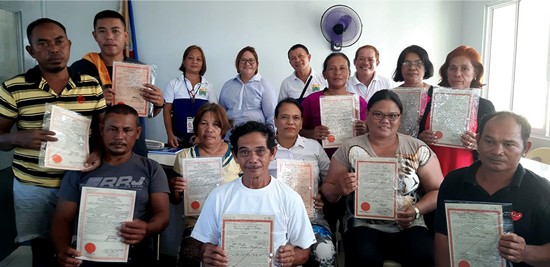
The
agrarian reform beneficiaries (ARBs) show their Emancipation
Patents (Eps) and Certificates of Land Ownership Award (CLOAs)
after the distribution. With them in photo are Zumarraga
Mayor Myrna Tan (standing, 4th from left) and Municipal
Agrarian Reform Program Officer (MARPO) Evelinda Barbasa
(standing, 3rd from left). (photo Engr. Jessie Iso) |
DAR distributes
CLOAs to Samar islanders
By
JOSE ALSMITH L. SORIA
March 21, 2020
ZUMARRAGA, Samar –
Eighteen landless farmers from this island-municipality in the
province of Samar turned landowners as they received Emancipation
Patents (EP) and Certificates of Land Ownership Award (CLOAs) from
the Department of Agrarian Reform (DAR) on March 12.
Zumarraga Mayor, Myrna
Tan, handed the 24 land titles to the 18 agrarian reform
beneficiaries (ARBs) in a simple ceremony at the town’s Sangguniang
Bayan Session Hall. She was assisted by Municipal Agrarian Reform
Program Officer (MARPO) Evelinda Barbasa.
Barbasa disclosed that the
EPs and CLOAs, distributed to the ARBs under the government’s
Comprehensive Agrarian Reform Program (CARP), covered a combined
area of 22.8012 hectares of corn lands and coco lands situated in
the Barangays of Tubigan, Canwarak, Maputi, and Pangdan.
She added that the EP-CLOA
distribution was part of a weeklong celebration in commemoration of
the town’s 157th founding anniversary.
CARD implements
one-month moratorium for clients
Press Release
March 21, 2020
SAN PABLO CITY –
The financial institutions of CARD Mutually Reinforcing Institutions
(CARD MRI) have suspended its microfinance operations from March 17
to April 12, 2020. This is in response to the recent declaration by
the Philippine Government of an enhanced community quarantine due to
the COVID-19 outbreak.
While the obligation for
weekly loan payments are lifted until the resumption of its
operations, CARD Main Bank Branches will remain open so that clients
can perform transactions such as deposits and withdrawals. These
bank branches will open at 9:00AM and close at the latest 3:00PM, as
there are branches which are locally required to close earlier than
3:00PM. Likewise, bank clients can still transact through ATMS,
Digital Cash Machines, and the konek2CARD app. Savings withdrawals
can also be facilitated by konek2CARD agents of CARD Banking Group.
“This is our effort to
show our sympathy and concern to our clients in these trying times,”
said Dr. Jaime Aristotle B. Alip, CARD MRI Founder and Chairman
Emeritus. “We understand that our clients would face liquidity
problems and potential losses. It is through implementing moratorium
that we can support them.”
Continuous Support
CARD MRI Managing Director
Flordeliza Sarmiento also added that other essential services will
still be provided. “COVID-19 is a serious health threat thus we know
that this is the time when we are needed by our clients and staff
the most. Our clinics and laboratory are still open for our clients
and staff while our pharmacy, BotiCARD, will remain open to the
general public,” she explained.
CARD Mutual Benefit
Association, the insurance arm of CARD MRI, will also be on
moratorium for its insurance contributions but will still process
and disburse claims benefits. Clients may settle their claims in
CARD MBA Provincial Offices and the main bank branches of CARD Bank,
CARD SME Bank, and CARD MRI Rizal Bank.
CARD MRI is a group of
institutions that aims to eradicate poverty through microfinance and
other development-oriented programs. Of its member institutions,
those offering the moratorium are CARD, Inc. (A Microfinance NGO),
CARD Bank, CARD SME Bank, and CARD MRI Rizal Bank. CARD MRI has 6.7
Million clients, 19,027 staff, and 3,241 offices nationwide.
Considered the largest in the microfinance industry, CARD MRI is an
important catalyst in the country’s economy down to the community
level, as it provides capital that enables poor households to engage
in microenterprises as well as generating jobs directly and
indirectly.
United as one
CARD MRI also joins other
members of the two largest microfinance networks in the country,
Alliance of Philippine Partners in Enterprise Development (APPEND,
Inc.) and Microfinance Council, in the battle against COVID-19.
Insurance services and
claims of these microfinance institutions (MFIs) remain
uninterrupted.
Further, these MFIs will
continue paying for the salaries of their more than 50,000 staff
during this period of community quarantine.
True to their collective
vision of ending poverty in the Philippines, the microfinance
industry vows to fulfill its commitment to serve the most vulnerable
population even in challenging times like the COVID-19 outbreak.
Release the sick,
elderly, and “low-level” prisoners amid COVID19 crisis - NCCP
Press Release
March 20, 2020
METRO MANILA –
Church group National Council of Churches in the Philippines
supported the appeal of Kapatid, a group of families and relatives
of political prisoners, to the government to release the sick,
elderly and “low-level” prisoners. The NCCP said releasing them is a
Christian and compassionate gesture in the midst of the pandemic
especially since massive testing in the country is still not in
place.
Bishop Reuel Norman O.
Marigza, NCCP General Secretary, expressed grave concern for the
prisoners amid the rising number of COVID 19 cases in the country.
Bishop Marigza said, “Current measures in prisons are clearly
insufficient. Without massive testing, the overcrowded prisons in
the country is a health disaster waiting to happen. We cannot simply
accept what the Bureau of Corrections is saying that prisons in the
country are still free of cases of COVID 19 even though tests were
not administered there. Before disaster strikes, set them free!”
According to Bureau of
Corrections January statistics, its prison facilities are
overcrowded by 310 percent as 49, 114 inmates occupy prisons that
have a maximum capacity of 11, 981 persons. Justice Secretary
Guevarra has already admitted that a single COVID-19 case inside
could cause “calamitous effects”.
“Besides, the call for
release is selective, only those who will definitely suffer like the
sick and the elderly and of course, the prisoners of conscience who
have been wrongfully imprisoned because of their political beliefs”,
Bishop Marigza added.
The call for the release
of prisoners came in the wake of Iran’s gesture to free thousands of
its prisoners. The heavily congested prisons in the country are full
of detainees that come from the poor, especially after the
government’s campaign against illegal drugs.
The National Council of
Churches in the Philippines is the largest aggrupation of mainline
Protestant and non-Roman Catholic churches in the country.
Gravel road completed at barangays Buenavista, Ranera and Janipon
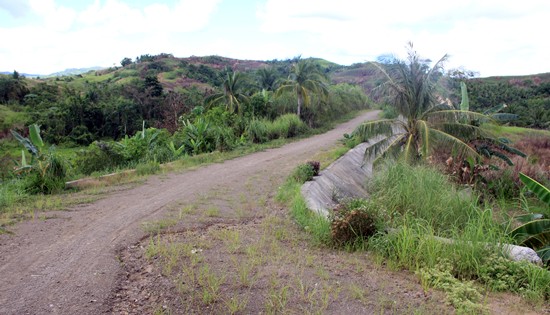
By
GISSELLE G. PARUNGAO
March 18, 2020
CALBAYOG CITY – A
gravel road amounting to P50 million was completed traversing three
Barangays of Buenavista, Ranera and Janipon at San Jorge, Samar.
The only means of
transportation for residents of said barangays would be by boat and
usually, only one trip is scheduled going to and from Buenavista as
Barangay Captain Raquel Duena, from Barangay Ranera narrated. From
there, that’s the only time that they can travel on a paved road to
San Jorge, Samar and other parts of the area. This in turn creates
hardships for residents of the barangays in terms of health matters
because of travel time and availability of boats.
Travel costs and time are
also a problem of farmers to transport their harvested root crops,
rice and vegetables grown from the barangay which is their means of
income to the nearest marketplace in San Jorge.
Students also have a hard
time going to school especially those attending their secondary
education since the nearest school is situated in the Municipality
of San Jorge. They would walk long hours to reach the school.
All these issues and
worries are now gone as an opening road with a length of 2.86
kilometers with a width of 8 meters was developed. The scope of work
includes two box culverts to preserve the creek that crosses through
the said road. Riprap is also included on areas with steep slopes to
prevent soil erosion and collapse of the structure.
Travel time through boat
will consume almost 2 hours while using the gravel road will only
take less than 1 hour to and from Barangay Buenavista to Janipon.
This road opening was
drawn from the General Appropriations Act of 2018.
P46.97M Macalpe
bridge in Caibiran town starts construction
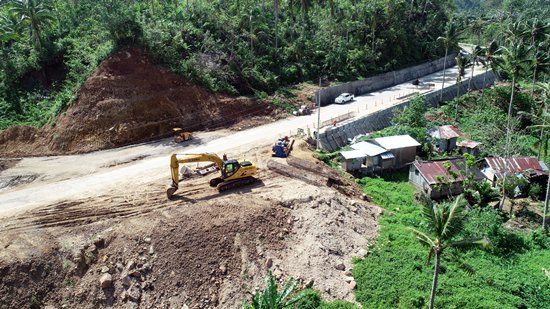
By
DPWH-Biliran
March 18, 2020
NAVAL, Biliran –
The Department of Public Works and Highways (DPWH) Biliran District
Engineering Office (DEO) has started the construction of the P46.97M
new permanent bridge at Sitio Macalpe in Brgy. Cabibihan, Caibiran,
Biliran.
The site of the said
project was previously an existing concrete paved road but was
totally washed out during the onslaught of Tropical Storm (TS)
Urduja on December 16, 2017.
David Adongay Jr.,
District Engineer said that the project is now in full swing under
contract with L.M. Baltonado Construction.
“The project is now
on-going in the preparation for the foundation works of the bridge,”
revealed Adongay.
“The site is critical for
sudden landslide specially during heavy rains, thus the contractor
was instructed to fast track the project to avail the good weather
condition,” he added.
According to Adongay,
there is a need to construct for a new permanent bridge on the said
section because a large volume of water crosses the roadway
especially during rainy season.
The project involves the
construction of a 4-lane bridge with a width of 13.4 meters with a
total length of 20.0 meters or a total area of 291.43 square meters.
This project has a target completion date on June 25, 2020.
When completed, this
project will provide a structure that can accommodate big volume of
rainwater, minimize vehicular accident as well as provide
convenience in transporting agricultural and aquatic products to
market centers.
This bridge is essential
in going to the only Provincial Hospital and Port of the Province
and some tourist sites within the island. It will serve more or less
3,000 travelers along Naval-Caibiran Cross Country Road (NCCR).
Presently, DPWH-Biliran
DEO maintains a total of 35 national bridges within its jurisdiction
with a total length of 1,250-linear meter of both asphalt and
concrete surface. The completion of the new Macalpe Bridge would be
an addition to this total length of bridges.
Save the Children
Philippines urges health support for vulnerable groups who face more
risks to COVID-19
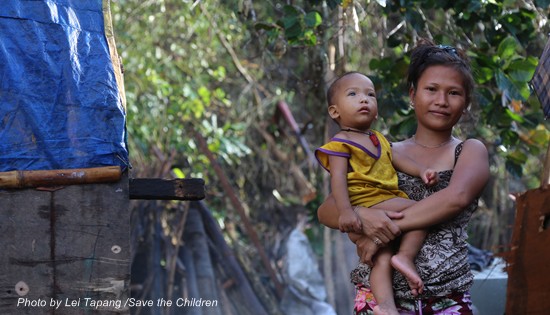
Press Release
March 18, 2020
QUEZON CITY - Save
the Children Philippines is calling on health and local government
authorities to prioritize deprived and marginalized families and
their children who are more at risk to Coronavirus acute respiratory
disease 2019 (COVID-19) due to their lack of access to health
services.
The call was made after
President Duterte announced on Monday the implementation of
Luzon-wide Enhanced Community Quarantine. The order imposes a strict
home quarantine and suspension of mass transportation for one month
from March 17 to April 17, 2020 to prevent further spread of
COVID-19. There are now 142 confirmed cases of COVID-19 in the
Philippines as of Wednesday (March 17, 2020) with 12 deaths.
The Child Rights-based
group also raised concern on the first case of COVID-19 transmission
to a 13-year-old girl in Quezon City. The girl, who is the country’s
135th confirmed case has no history of travel to other countries
affected by COVID-19.
Atty. Alberto Muyot, Chief
Executive Officer of Save the Children Philippines, said while
COVID-19 threatens the general public, there are communities more
vulnerable to suffer further socio-economic marginalization due to
the impact of the viral disease that has been declared a pandemic by
the World Health Organization.
There are more than 15
million (DOLE, 2018) parents and caregivers who rely heavily on the
informal economy or whose earnings require them to use public
transport, sell items and render services in crowded places or
streets.
The elderly, particularly
those with pre-existing conditions, along with children and adults
with disabilities, indigenous people, and the urban poor are also
vulnerable to the COVID-19 spread. The conditions of these
vulnerable communities such as food insecurity, malnutrition and
inadequate delivery of basic service compromise their resistance to
diseases and predispose them further more serious health conditions.
“Children whose parents
need to stay in high density areas to earn a living, or those living
in hard to reach areas with no access to clean water are among the
most vulnerable to the COVID-19,” said Atty. Muyot.
Children and families who
belong to indigenous peoples are vulnerable to the COVID-19 spread
due to their limited access to health and other social services,
facilities, technologies, and do not have enough opportunities to
cope also need urgent support from the local government units and
health authorities.
“We call on the government
to give these vulnerable groups priority assistance, and also engage
them in decision-making processes for their response, recovery, and
preparedness,” said Atty. Muyot.